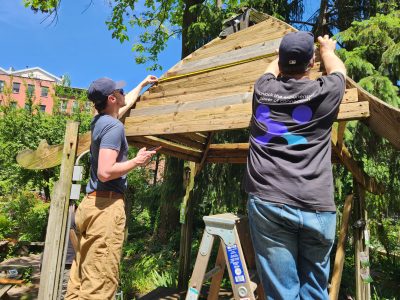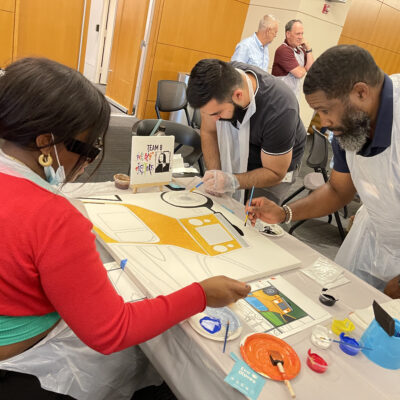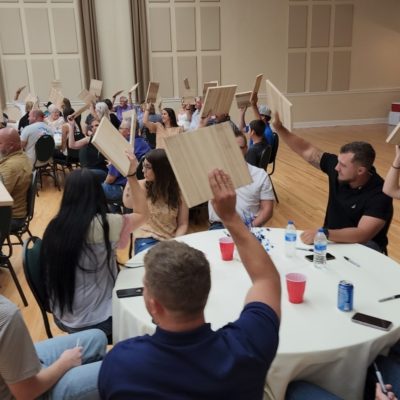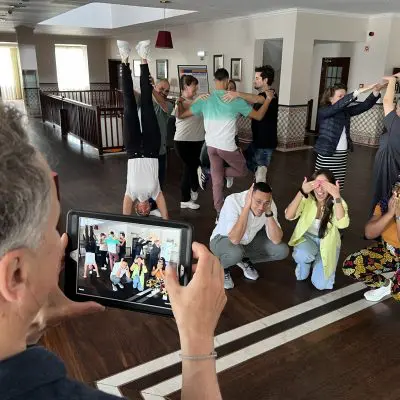Adaptability at Work: Why it Matters
I’ve seen a lot of core value changes in the workplace over the years: new technologies, shifting team dynamics, evolving goals. But nothing tested our resilience like the early days of the pandemic. It forced us to rethink everything. And the one thing that got us through was our ability to lean on every adaptive skill we had, from creative problem solving to staying connected while working remotely.
I talked about this a bit on our Team Building Saves the World podcast in the “Making Work Fun” episode, where we dug into how TeamBonding weathered the storm. We didn’t just survive; we adapted and came out stronger for it.
My Experience with Adaptive Skill
Back in 2009, during one of the worst economic downturns in decades, the safe thing to do would’ve been to hunker down. Cut costs. Avoid risks. But I didn’t do that. I launched a chocolate tour company. A real one. With truffle workshops, chocolate and wine pairings, cupcake tastings, and walking tours across Boston. Why? Because I had an idea during a trip with my daughter, and I believed that chocolate could bring people together, even when the world felt uncertain.
And I was right. That company took off. Even during snowstorms, people showed up with their vouchers and their sweet tooth. The business eventually wrapped up, but what I learned from that time stuck with me. It taught me to trust creativity, take risks with purpose, and lean into the power of an adaptive skill when everything around you feels like it’s changing.

That mindset carried over to TeamBonding. When COVID hit and in-person events vanished overnight, I didn’t panic; I pivoted.
We turned one of our chocolate programs into a virtual experience, sent kits to remote teams, and brought a little joy into the work-from-home world. Being adaptable didn’t just save us; it made us better. And it made me more convinced than ever that adaptability at work isn’t a luxury. It’s a necessity.
What Is an Adaptive Skill?
Adaptive skill is the ability to adjust your behavior, mindset, or approach in response to new challenges or shifting environments. The formal adaptive skills definition goes even deeper, highlighting the emotional resilience and cognitive flexibility that allow someone to thrive when things don’t go according to plan.
People with strong adaptive and power skills don’t freeze up when the unexpected happens. They ask questions, look for solutions, and move forward with confidence, even if the path ahead isn’t apparent.
Adaptive Skills Examples
When I think about what makes a team truly strong, it’s not just technical know-how or experience. It’s flexibility and professional development. It’s that moment when everything changes, whether it’s a project deadline, a team structure, or even your whole business model, and your team doesn’t panic. They adjust. That kind of mindset starts with an adaptive skill.
So, what is an adaptive skill?
At its core, it’s the ability to adjust to changes in your environment, whether those changes are minor or massive. It’s about responding rather than reacting. And it’s something that every professional needs, no matter the industry. That’s why I care so much about building teams that can bend without breaking.
Here are a few of the adaptive skills examples I focus on when designing team building experiences or mentoring new leaders.
Collaboration
The heart of a strong team is collaboration. I’ve watched teams come together during challenging moments, not because they had the answers, but because they trusted each other enough to figure things out. Whether it’s solving problems, bouncing ideas around, or backing each other up when deadlines get tight, collaboration is the glue that holds it all together.
We bake this into our team building programs too. When people share challenges and successes outside of their usual day-to-day, they learn how to work together and effectively communicate in new ways. That’s when real growth starts to happen.
Technology Competence
Workplace technology evolves faster than most of us can keep up. I’ve had to learn entirely new platforms to stay connected to my team. And I’ve seen employees go from hesitant to fully confident in tools they’d never used before.
Technology competence isn’t about knowing every app or shortcut. It’s about staying curious, being open to learning, and not letting new systems intimidate you. This is a core adaptive skill, and it’s one of the most visible ones in today’s workplace. Whether it’s project management software, bringing AI into the workplace, communication platforms, or event tech, the ability to quickly pick up new tools is essential in an adaptive workplace.
Creativity
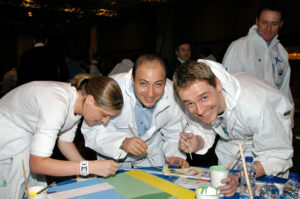
Employees participating in Big Picture, a mural painting team building event to inspire creativity!
If adaptability had a personality, it would probably be creativity. When things change, the creative thinkers are usually the first ones to step up and say, “Okay, what if we try this instead?” I’ve seen teams come up with some of the most unexpected and brilliant solutions in the middle of high-pressure challenges.
Creativity isn’t just for artists or designers. It’s for anyone who wants to approach problems with fresh eyes and confidence. That’s what makes it such a powerful adaptive skill; it opens doors when everything else feels stuck.
Open-Mindedness
There’s no adapting without openness. Period. Whether it’s being open to feedback, trying a new workflow, or hearing someone out when they see things differently, open-mindedness is at the heart of every strong team I’ve worked with.
I remember early on in my career thinking I had all the answers. But over time, I’ve realized that being open to new ideas has created the most significant breakthroughs, not just for TeamBonding, but for our clients, too. When you build a team that approaches challenges with curiosity rather than defensiveness, you’re creating the kind of culture where adaptability becomes second nature.
Critical Thinking
Adapting isn’t just about reacting quickly; it’s about thinking deeply for skill development. Critical thinking helps you look at a situation, understand all the moving parts, and make wise choices, even when the pressure’s on. It’s one of those adaptive skills examples that often go unnoticed, but it’s essential.
In my work, I’ve had to make some tough decisions. Do we invest in a new program? Do we pull the plug on something that isn’t working? Those decisions take more than instinct. They bring critical thinking and the humility to admit when something needs to change.
How to Foster Adaptability at Work
You can’t just talk about adaptability. You have to live it. Creating an adaptive workplace takes time, intention, and a willingness to try new things. I’ve learned this firsthand by building a company that helps other companies grow. It’s not about having the perfect system. It’s about building the kind of environment where people feel safe to experiment and supported when things don’t go perfectly.
So how do you build that kind of culture? Here’s what’s worked for me.
Provide Regular Feedback
Feedback isn’t always easy to give or receive, but it’s necessary. I believe feedback should be part of the everyday conversation, not just something that shows up in an annual review. When you make feedback a habit, it helps everyone adjust, grow, and feel more confident taking on new challenges.
Whether it’s a casual check-in or a formal coaching moment, feedback reinforces adaptability at work. It helps people see where they’re doing well and where they can stretch further. And when delivered with care, it builds trust.
Recognize and Reward Hard Work
Nothing fuels growth like recognition. When someone on your team steps up, adapts, or solves a problem creatively, point it out. Celebrate it. Recognize and reward it. It doesn’t have to be big; a shoutout, a handwritten note, or a team meeting mention can go a long way.
Acknowledging effort shows your team that adaptive skills are valuable. It reinforces the idea that trying, learning, and adjusting are part of the process, not something to fear, encouraging internal mobility.

Provide Training and Development
People can’t grow if you don’t give them space and support to do it. That’s why I’m a big believer in ongoing employee development. Workshops, online learning, mentorship, and job shadowing are all great ways to build adaptability. You’re not just teaching skills. You’re teaching confidence.
Professional development should include learning about the adaptive skills definition so employees understand exactly what they’re building. You’re helping them see how these qualities apply in their work and permitting them to keep improving.
Facilitate Cross-Functional Collaboration
When different departments work together, you create a richer pool of ideas and insights. It forces people out of their bubbles, which is a good thing. I’ve seen magic happen when marketing sits down with customer service, or sales partners with operations. It’s not always smooth at first, but the learning curve is worth it.
Cross-functional collaboration strengthens communication, flexibility, and empathy, all foundational pieces of a high-functioning, adaptive workplace. And the best part? The connections that form often stick long after the project ends. Consider Change Management and Human Skills to encourage workplace adaptability.
Adaptability Activities for Employees
Learning through experience is one of the fastest ways to grow. That’s why I design adaptability activities for employees that aren’t just educational; they’re fun. When people are immersed in a challenge that requires communication, improvisation, and quick thinking, they build those adaptive skills without even realizing it.
Some activities focus on solving complex puzzles together. Others ask teams to build something from scratch or pitch a wild idea under a time limit. No matter the setup, the outcome is the same: stronger skills, deeper bonds, and a more prepared team.
These activities help people loosen up and practice flexibility in a safe space. Then, when real-life changes come, they’ve already built the confidence to handle them.
- Escape the Mob is a fast-paced team building adventure that blends a high-tech scavenger hunt, escape room, and murder mystery. Race against time to create an alibi, recover stolen diamonds, and outsmart the Mob in this immersive, story-driven experience designed to challenge collaboration, critical thinking, and problem-solving skills.
- Team Resilience Training equips your group with practical strategies for wellness and adaptability. Through engaging activities, participants learn how to manage stress, boost well-being, and support one another during times of change. This program strengthens both individual and team resilience, helping your workplace stay productive and positive through any challenge.
- Day at the Museum: Scavenger Hunt transforms your favorite museum, zoo, aquarium, or gallery into a playful, team-powered adventure. With a custom map and brain-teasing clues, teams race to solve challenges, explore exhibits, and uncover hidden gems. It’s culture, creativity, and collaboration wrapped into one unforgettable scavenger hunt experience.
Create an Adaptive Workplace with Team Building
A truly adaptive workplace is about more than structure. It’s about people. It’s about creating an environment where every team member feels empowered to shift gears, learn something new, and support one another.
If you’re ready to help your team grow their next adaptive skill, I’d love to help you make that happen. Let’s build something together. Contact us at TeamBonding to explore more of our team building activities for an adaptive workplace!
Get more insights in our newsletter:
* every subscription supports charity!
Plays well with these activities.
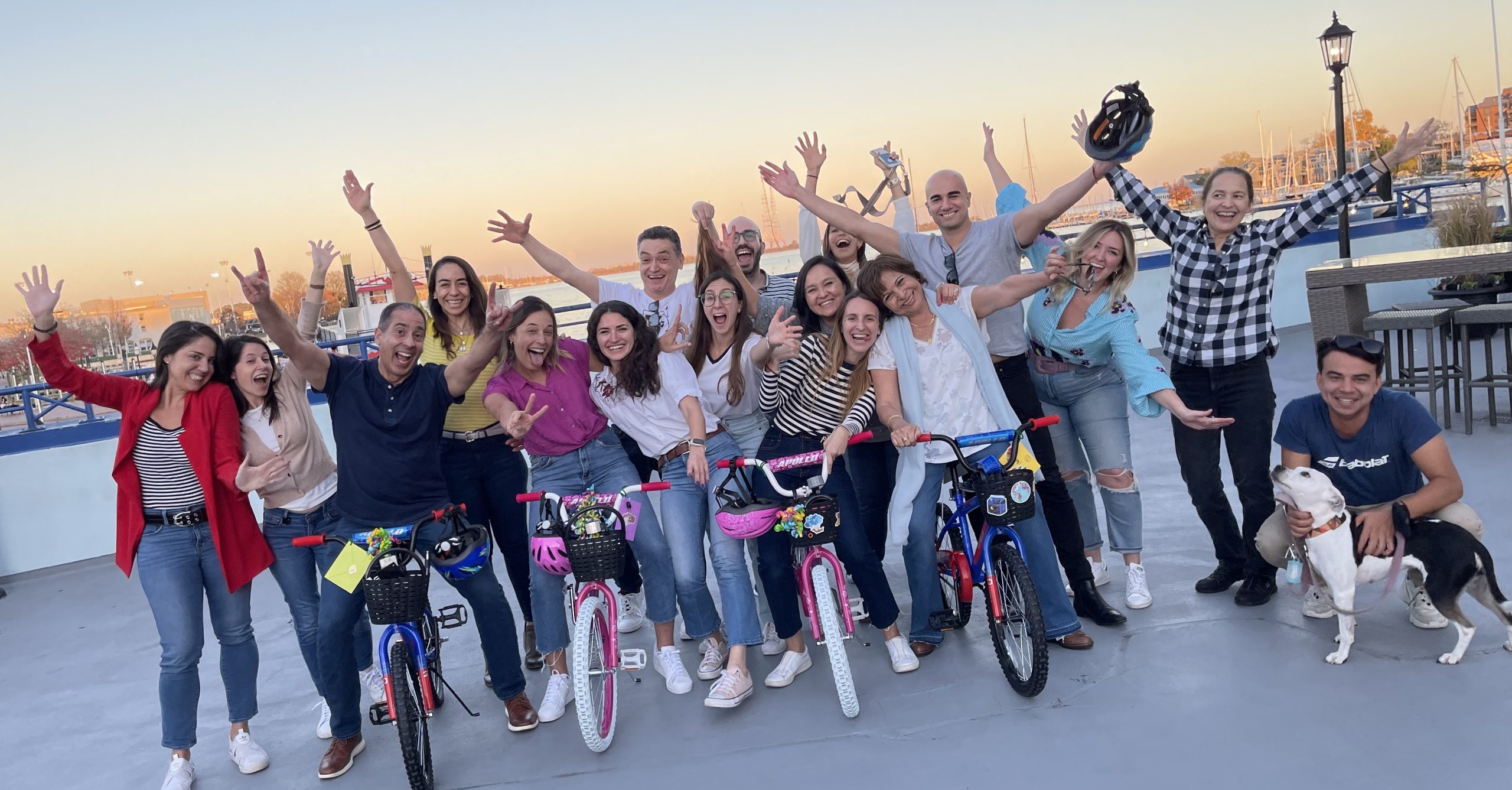

 Unlock exclusive resources for better teams. Every subscription supports charity!
Unlock exclusive resources for better teams. Every subscription supports charity!
Create Your Free Account
Get exclusive access to new programs from the TeamBonding Lab, save your favorite ideas, and track your upcoming events.
Already have an account? Login


